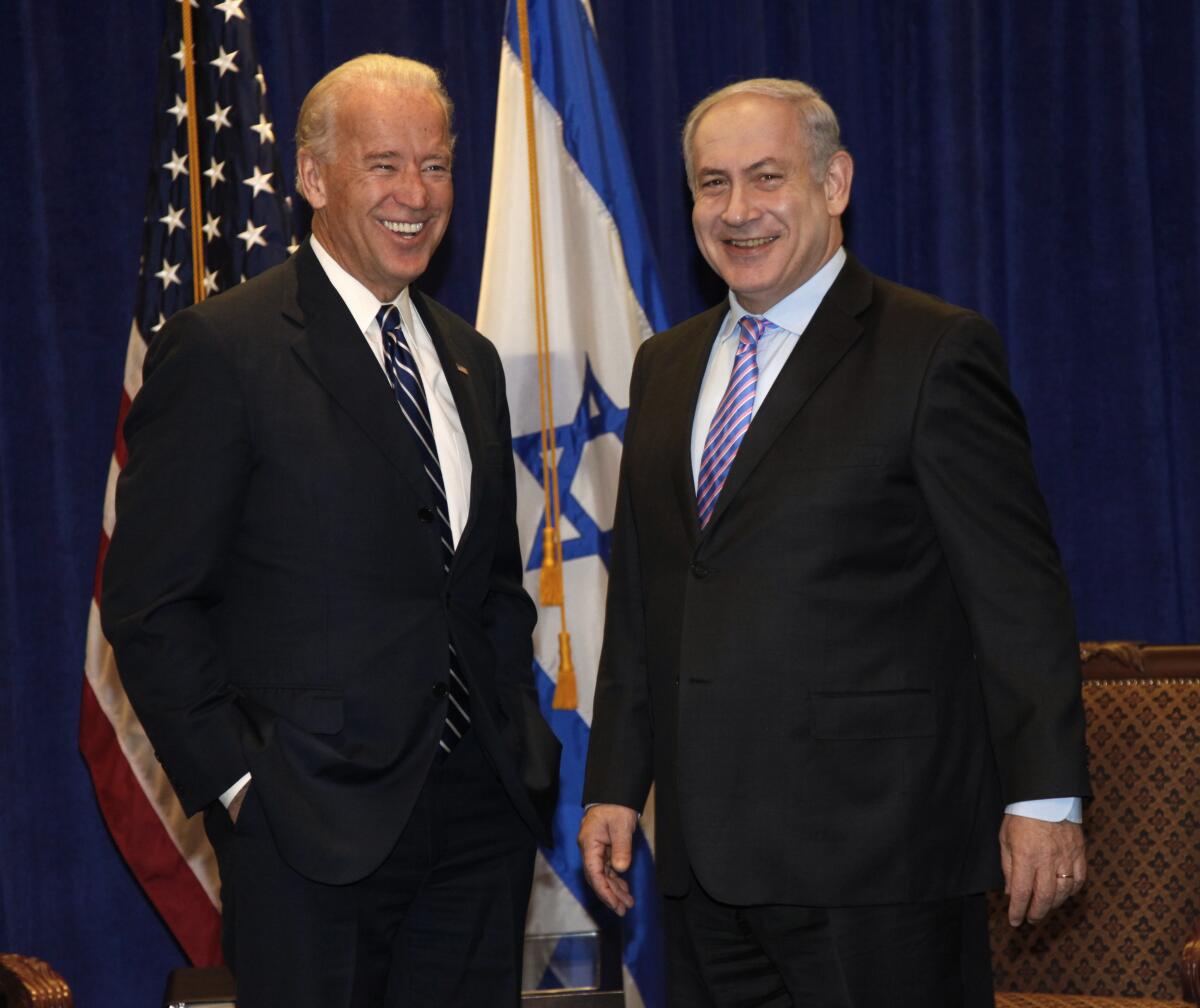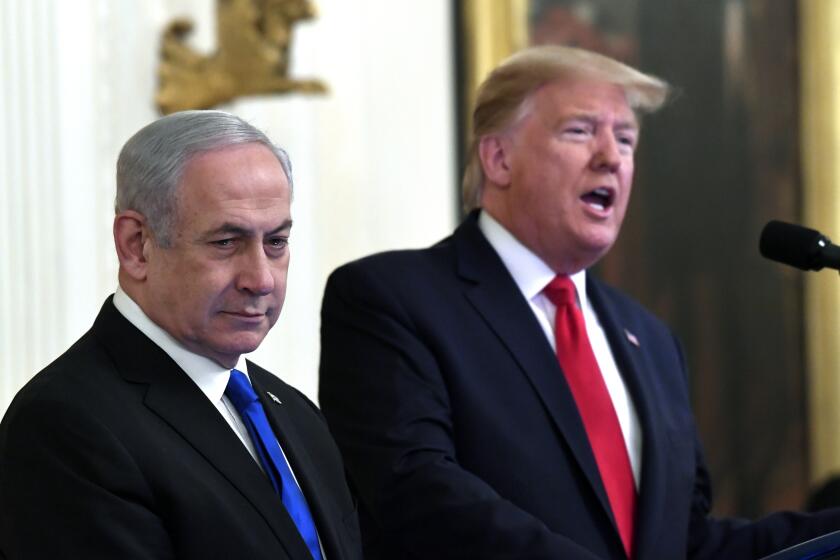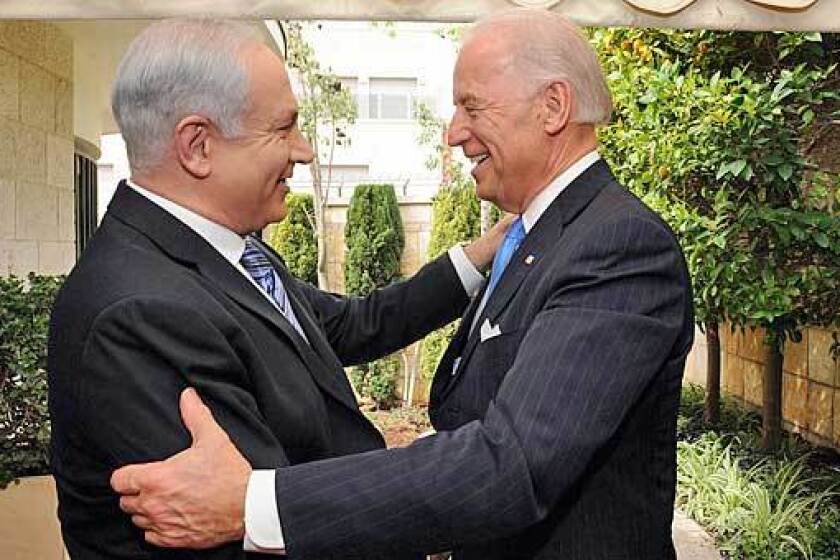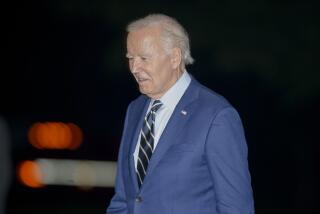Biden’s snub of Netanyahu sets the tone for more evenhanded U.S.-Israel relationship

- Share via
WASHINGTON — It took nearly a month, but Israeli Prime Minister Benjamin Netanyahu’s number on President Biden’s dance card finally came up.
After calling more than a dozen other world leaders since taking office, Biden on Wednesday telephoned his Israeli counterpart. Netanyahu tweeted out a photograph of himself at his desk and on the phone, grinning like the Cheshire cat.
But the long delay — seen as a diplomatic snub considering Netanyahu was President Trump’s third call to a foreign leader upon taking office — drove Israelis crazy.
Commentators and politicians were abuzz with speculation that Biden was freezing out Netanyahu after four super-cozy years with the Trump administration. Or perhaps, they were saying, Biden didn’t want to be seen favoring Netanyahu ahead of Israel’s March 23 national elections.
Danny Danon, a former Israeli ambassador to the United Nations, tweeted out a list of 10 countries Biden had already called. “Might it now be time to call the leader of #Israel, the closest ally of the #US?” he said. He offered a phone number that Biden could dial, though it had been disconnected.
For Israel’s Benjamin Netanyahu, navigating a Biden presidency poses a challenge after going all in with Trump.
Rest assured, foreign policy experts say, Biden clearly had Netanyahu’s number — in more ways than one. By making the notoriously arrogant Israeli leader cool his heels while waiting for a call, Biden was signaling a significant refocusing of U.S. foreign policy in the Middle East to become more evenhanded in the Israeli-Palestinian conflict.
“A clear message is being sent,” tweeted Aaron David Miller, a veteran Middle East peace negotiator.
White House Press Secretary Jen Psaki denied the president intended to slight Netanyahu.
“His first call with a leader in the region will be with Prime Minister Netanyahu,” she said Tuesday. “It will be soon.” A day later, the Israeli Foreign Ministry confirmed the call took place.
Biden, who has known Netanyahu for decades, appears eager to resume a more traditional relationship with Israel, one with strong ties and cooperation, but without the fawning support that characterized the Trump administration.
“There’s no question the Trump administration gave Israel everything it wanted — more than it wanted,” said Shira Efron, an Israel expert at think tank Rand Corp. in California. Israelis are going to have to get used to not being the center of Washington foreign-policy discussions, at least for the near future, she said.
Biden’s cooler approach contrasts with Trump’s effusiveness toward Israel. Trump moved the U.S. Embassy from Tel Aviv to Jerusalem, recognized Israeli sovereignty over disputed land in Jerusalem and Golan Heights, and cut off aid to Palestinians, including to refugees and Christian hospitals. Trump’s proposed Mideast peace plan was viewed as one-sided in favor of Israel and was quickly rejected by Palestinians.
President Trump presented his long-promised plan to address the Israeli-Palestinian conflict, giving Israel virtually everything it wanted.
Trump and Netanyahu were so linked that the Israeli leader used the American president’s picture in campaign billboards in the last three inconclusive Israeli elections. Israelis are naming settlements after Trump.
Biden is setting a different course. He won’t move the U.S. Embassy back to Tel Aviv, but he plans to restore Palestinian aid and hopes to reestablish the U.S. as a credible mediator in the peace process. Despite Israel’s objection, Biden is moving to rebuild an Iran nuclear accord with other world leaders that Trump scuttled.
And Efron and other analysts say the Biden administration hopes to return to the goal of the creation of a Palestinian state as part of the solution to the conflict. Trump largely abandoned the idea.
Biden will also revert to what had been U.S. policy for decades: that Israel should stop building Jewish settlements on West Bank land claimed by Palestinians. Most of the world considers the settlements a violation of international law.
Michael Koplow, policy director for the Israel Policy Forum, a U.S.-based pro-Israel advocacy group that supports creation of a Palestinian state, said Biden’s foreign policy shift will mean, at least initially, that Israel and peace negotiations will not be top priorities. Every president since George H.W. Bush has tried and failed to settle the U.S.-Palestinian conflict.
The U.S. Embassy probably stays in Jerusalem, but Biden would want to undo several Trump actions in the Middle East.
The Biden administration “is very clearly telegraphing that they don’t intend to go down that road again,” he said. Koplow noted that Biden has not yet named a U.S. ambassador to Israel or designated a special envoy for the region, as other recent presidents have done.
Biden’s Middle East policy reset may also change the U.S. relationship with Saudi Arabia.
As he did with Netanyahu, Trump offered unquestioning support to the de facto Saudi leader, Crown Prince Mohammed bin Salman, a close friend of Trump’s son-in-law and advisor Jared Kushner.
“We’re going to recalibrate our relationship with Saudi Arabia,” Psaki said. She added that future engagement will be “counterpart to counterpart,” which is to say Biden will speak to King Salman and not his son — a significant rebuke.
“That’s certainly a shift from the approach of the prior administration,” Psaki said.
Publicly Netanyahu downplayed any significance of the silent ring from Biden. Other U.S. administration officials such as Secretary of State Antony J. Blinken have spoken to their Israeli counterparts. Netanyahu acknowledged the many more pressing crises and priorities that Biden faces, including the pandemic, domestic political unrest, economic disaster and, internationally, China and Russia.
On Wednesday, a clearly relieved Netanyahu reported: “It was very friendly and warm.”
More to Read
Get the L.A. Times Politics newsletter
Deeply reported insights into legislation, politics and policy from Sacramento, Washington and beyond. In your inbox three times per week.
You may occasionally receive promotional content from the Los Angeles Times.














